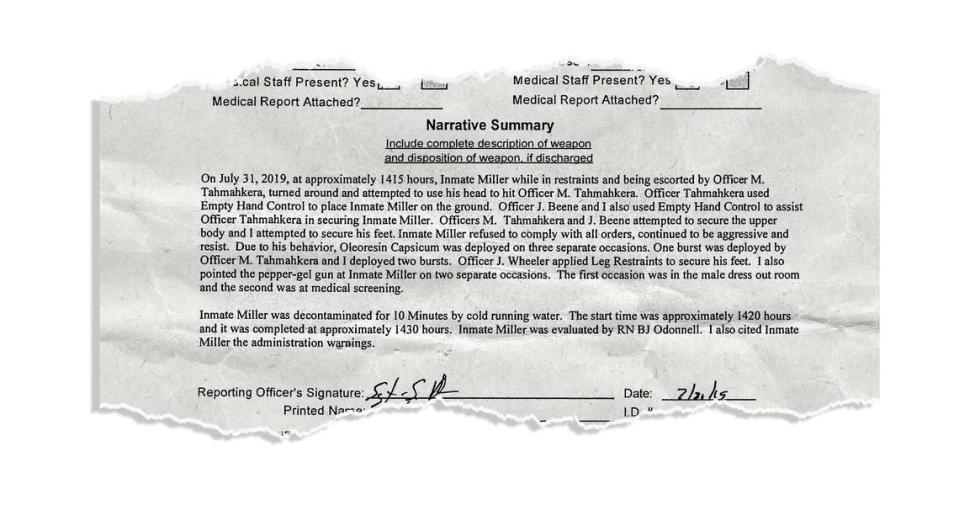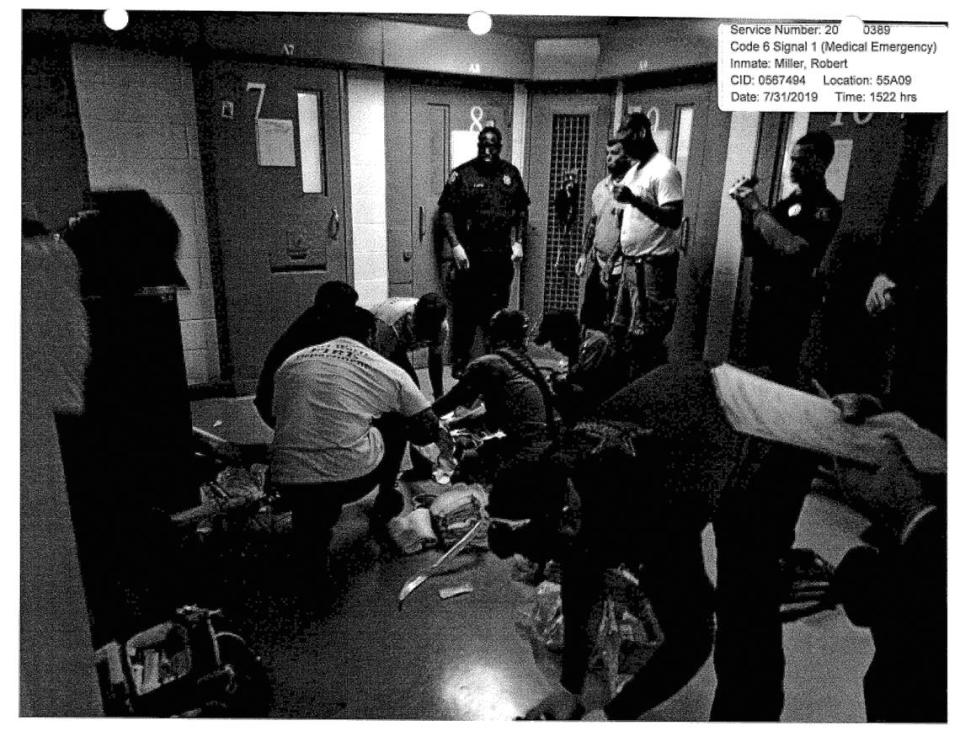An outside expert revisited a Tarrant jail death. What he found is being kept secret.
Tarrant County has withheld for weeks the results of an independent review of the autopsy report for Robert G. Miller, who died in 2019 after being pepper-sprayed multiple times during his booking in jail.
The review followed a Star-Telegram investigation that raised questions about Miller’s cause of death, which Tarrant County’s autopsy report listed as natural from a sickle cell crisis.
In December, the county commissioners contracted with an independent forensic pathologist from Illinois to reexamine the autopsy findings. The contract with J. Scott Denton expired Feb. 28.
More than a month later, county officials have remained silent on Denton’s findings and have not released documents that the Star-Telegram has requested under the state’s public records law.
Miller, 38, was living in a camp off East Lancaster Avenue when Fort Worth police arrested him on outstanding misdemeanor warrants related to homelessness. He became upset when the officers didn’t let him clean up his camp and kicked a police car’s door, which elevated his charges and landed him in Tarrant County Jail, according to the Star-Telegram investigation of the case published in October.

Once at the jail, sheriff’s officers pepper-sprayed him at least three times at close range during booking, with officers later recounting that Miller had been combative. Miller, who had asthma, complained to a nurse that he couldn’t breathe.

Jailers found him unconscious and face-down in his cell 38 minutes later. He died the next morning at JPS Hospital with inflamed lungs, a swollen neck and blood leaking from his ears and nose, according to medical records obtained by the Star-Telegram.

Dr. Richard Fries, a forensic pathologist, conducted Miller’s autopsy at the Tarrant County Medical Examiner’s Office. His finding of death by natural causes from a medical condition prompted the Texas Rangers to close its investigation into Miller’s in-custody death.
Miller’s family said he did not have sickle cell disease. Experts who spoke with the Star-Telegram after reviewing Miller’s medical records came to the same conclusion.
One of them was Hannah Lichtsinn, an internal medicine doctor and sickle cell expert in Minnesota. Lichtsinn said the doctors at JPS Hospital tested Miller’s blood and noted his red blood cells were healthy, not anemic where they could deprive him of oxygen. Sickle cell disease is a hereditary blood disorder that can indeed cause sudden death, but it can be visibly diagnosed by doctors — almost always when someone is a child — and rarely exists in adults who don’t know they have it.
“I can tell you his kidneys were healthy until he had his cardiac arrest,” Lichtsinn told the Star-Telegram, describing her observations from the hospital records. “I can tell you that his blood counts were pretty normal until he had his cardiac arrest, and so was his liver. I can tell you that he wasn’t on drugs. And I can tell you he didn’t have sickle cell anemia.”
After the contract expired for the independent autopsy review in February, The Star-Telegram requested public records related to the findings. Tarrant County officials have sent the request to the Texas Attorney General’s Office for an opinion on whether they can withhold the records.
County administrator G.K. Maenius told the Star-Telegram in March that he could not comment because of pending litigation. He was likely referring to a federal wrongful death lawsuit that Miller’s widow, Shanelle Jenkins, is pursuing against the Sheriff’s Office.

But on Monday, a federal appeals court delivered a blow to Jenkins’ case, preventing her from proceeding with the lawsuit. Jenkins had sought to amend her complaint with new information about what happened to Miller in jail, but such cases must be filed within two years of a death.
It’s unclear whether the ruling will prompt Tarrant County to release the autopsy records, since the litigation is no longer pending.
Jenkins’ lead attorneys in the case, David Henderson and Jennifer Despins, did not immediately return calls for comment Monday. Maenius said Monday he would have to touch base with the Tarrant County District Attorney’s Office before he could comment.

The last time county commissioners spoke about Miller’s case was during a nearly two-hour closed session Feb. 21 — a week before the county’s contract with Denton ended. When the commissioners reconvened, they took no action.
Jenkins’ lawyers also have sought the results of the autopsy review have answers either.
Attorney Sebastian Van Coevorden said trying to get information has been like “pulling teeth.” He also has filed public records requests.
“It’s difficult because I have to explain to (Jenkins) that we do not know what is going on,” he said. “That we expected the contract to come out, or the medical examiner’s report come out, and at least give us a little bit more context.”
Van Coevorden said he thought the public deserved to know whether the medical examiner’s office would give the same consideration to deaths behind bars as it does to other deaths across the county. The public should know the truth about what happened to Miller, he said, and whether the commissioners or county government has information that could shed light the death.
“Justice will ultimately be the fact that the truth has come out, and that Ms. Jenkins fully understands the role that individuals of Tarrant County have in being responsible for Mr. Miller’s death, and it would be something that would be adjudicated by a court or at least acknowledged by the county,” Van Coevorden said.

